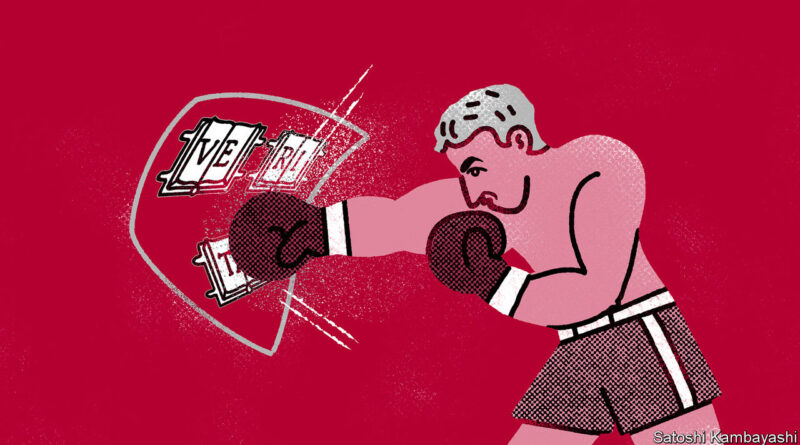Bill Ackman provides a lesson in activist investing
As with every skirmish in America’s culture wars, how you view the ousting of Harvard University’s president has much to do with where you are sitting. Claudine Gay resigned on January 2nd. Progressives see her as a competent administrator who, as Harvard’s first black president, was subjected to a smear campaign. Conservatives, meanwhile, spy a plagiarist who failed to quash antisemitism on campus. Naturally, your columnist—perched at a Bloomberg terminal—views the episode in its true light: as a blood-on-the-carpet coup by an experienced activist investor, disposing of an errant chief executive.
The investor in question is Bill Ackman, one of Wall Street’s more outspoken hedge-fund bosses. He is also one of Harvard’s more generous donors, having given it $50m. And he has spent recent months on the warpath, berating the university for failing to protect Jewish students from antisemitic attacks.
Then came a congressional hearing in which Ms Gay and two other university presidents prevaricated over whether calling for a genocide of Jews would violate their institutions’ codes of conduct. “The world will be able to judge the relative quality of the governance” at the three schools, Mr Ackman wrote, “by the comparative speed with which their boards fire their respective presidents.” A month on, two of the three are gone.
Although Mr Ackman’s fund prefers “quiet, constructive engagements” with the companies it owns, he made his name as a fearsome boardroom brawler. Over the years he has picked high-profile fights with America’s Municipal Bond Insurance Association, the Canadian Pacific railway and Target, a retail giant. Unsurprisingly, then, his most recent campaign bore all the hallmarks of a veteran activist heading into battle—and carries lessons for how to win one.
First, and most important, make sure you are in good company. Mr Ackman was just one of many to go after Ms Gay, making the tactics of a successful campaign much easier to deploy. The obvious one is financial pressure: Mr Ackman says he is aware of $1bn-worth of donations being withheld from the university since October 7th. That sort of firepower is a lot easier to muster if you are acting in concert with others. Think of the pack of hedge-fund managers George Soros assembled to short the pound in the 1990s.
Strength in numbers also made the second line of attack—forensic analysis of the opponent—more deadly. Activist short-sellers (a group that once included Mr Ackman) obsessively comb through their targets’ accounts; one of them, Carson Block, talks of reading many years of call transcripts, starting with the oldest. In the Harvard mess it was Mr Ackman’s fellow travellers, such as Christopher Rufo, a conservative activist, who trawled through Ms Gay’s work to find lines apparently copied from others without attribution. It was ultimately these accusations of plagiarism that toppled her. While others reviewed the documents, Mr Ackman was freed up to do his own due diligence, meeting hundreds of Harvard students and faculty members to establish how insiders viewed events.
No amount of allies, though, can help with the third requirement for an activist campaign: bloody-mindedness. Whatever the target, they are unlikely to be broken by the initial salvo—and may fire back. In 2021 Andrew Left, another short-seller, decided to quit the scene after furious meme-stock investors sent threatening messages to his children. Sure enough, Mr Ackman is now embroiled in a much bigger feud. On January 4th Business Insider, a news site, accused his wife, a former professor at the Massachusetts Institute of Technology, of a “similar pattern of plagiarism” to Ms Gay’s. Suspecting the allegation came from MIT, Mr Ackman responded by promising a plagiarism review of everything published by the university’s president, board and faculty.
For all its admirable chutzpah, the escalation points to danger ahead. Mr Ackman began by trying to combat antisemitism at Harvard by unseating a president who seemed soft on it. He now appears to be gearing up for a fight with much of America’s academic establishment over plagiarism, diversity policies and the future path of higher education. This scope may seem plausible to a man who rose to prominence by shorting the American mortgage market. Yet the best activist campaigns have specific aims and endpoints—and tend not to be fought against people with tenure. Even for Mr Ackman, his new venture will prove a tall order. ■
Read more from Buttonwood, our columnist on financial markets:
Why bitcoin is up by almost 150% this year (Dec 18th)
The mystery of Britain’s dirt-cheap stockmarket (Dec 14th)
Why it might be time to buy banks (Dec 7th)
Also: How the Buttonwood column got its name




